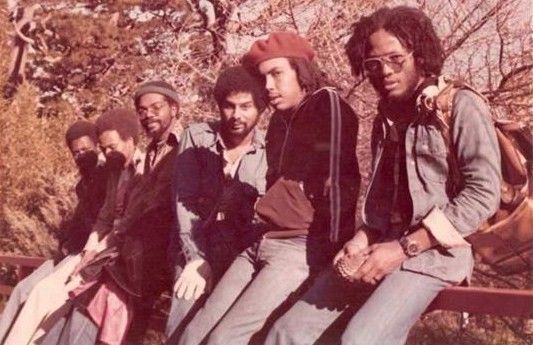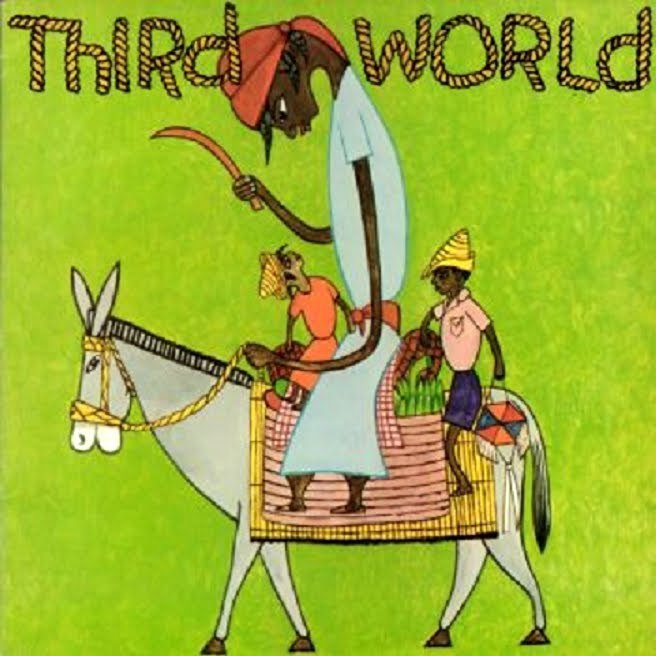Isn’t it a-bout time, as Stephen Stills once sang, to re-appraise Third World’s eponymous debut album? No? Well, I reckon it’s high time. Time to give the album and the band some due.
The music critic, Dave Marsh, whose The Heart of Rock and Soul: The 1001 Greatest Singles ever Made is one of my bibles, poor sad soul that I clearly am, awarded the album a single star in his Rolling Stone review and dismissed Third World in a brief paragraph as purveyors of 'perfectly mediocre reggae... nothing but sinewy dance music, slick but devoid of deep emotion'.
Since his main musical interest seems to be soul music, his primary concern would, I suppose, be feeling. But, reading between the lines, I think his beef seems to be that Third World were a middle-class Jamaican band, signed up by the Jamaican entrepreneur, Chris Blackwell, for his Island label at a time when the re-packaged Wailers had set the international ball rolling. The suggestion being that there's something inauthentic about it – which begs a version of the whole Can white men sing the blues? question.
In any case, the 'inauthentic' newcomers teamed up with their authentic label-mates when Third World would toured the UK as support act to the Wailers in 1976, the year this album came out. They would later go on to tour the US extensively as reggae missionaries, bringing sinewy dance riddims to the heathens.
I bought a copy of the album in the year of its release, intrigued by its distinctive album art and attracted, no doubt, by Virgin Records' introductory special offer. Later, I would buy the more generally approved follow-up, 96o In The Shade, but thereafter restricted my Third World purchases to the 7" format. Subsequently, however, I go back most consistently to the under-appreciated 'tentative' debut.
Mybee it's becorze I'm a Lundinner who loves to dance. With an extra percussionist in the six-piece line-up, there is indeed an emphasis on 'sinewy dance music'. And it's often very sinewy indeed. Third World – and less successfully, in my estimation, Inner Circle – were really the first Jamaican bands to blend reggae and disco/dance music.
Dave Marsh seems to object in particular to the kind of Santanic dance-oriented slant the band gave to two classic roots reggae songs: the Abyssinians' 'Sette Messgana' and Burning Spears' 'Slavery Days'. But I don't agree that, in so doing, Third World stripped the music of any emotion. It's maybe not the 'deep emotion' synonymous with the kind of southern soul that's a deeper shade of Doris Duke, the equivalent perhaps of roots reggae for purists, but their reinterpretations are atmospheric enough to give the originals a worthwhile new slant.
The two tracks dominate the first side. The LP's other numbers are mainly Third World originals. 'Brand New Beggar' and 'Sun Won't Shine', in particular, are fantastic, melodic songs that make you want to wind up your waist and suggest why they were reputedly such a popular live act. From here, it would only be another couple of albums before they cooked up something of the calibre of that perennial dance classic, 'Now That We've Found Love'.

This album is not a classic by that standard, but there’s not a bum note on either side and I’ve been partial to it ever since my inaugural listen in the record store’s headphones. And I think it illustrates an important point: even if the purity of the original music gets diluted in the process, music has to move on and assimilate new influences if it’s to evolve and survive.
Just as those rolling middle-class white Stones from South London mixed a little rock 'n' roll with Chicago blues in their musical test tubes to blend a 'new' product for a hungry new audience, so these six sons of rather better-heeled Jamaican parents would fuse dance music with orthodox reggae and create, to quote one of their song titles, 'roots with quality'.
Third World didn't hail from Trenchtown, but their distinctive reggae lite would help to internationalise the music and take it to places like West Africa, Brazil and even, for Jah's sake, New Zealand. That's not something to be sniffed at. So excuse me a moment please: 'love's got me dancing on the floor...'
